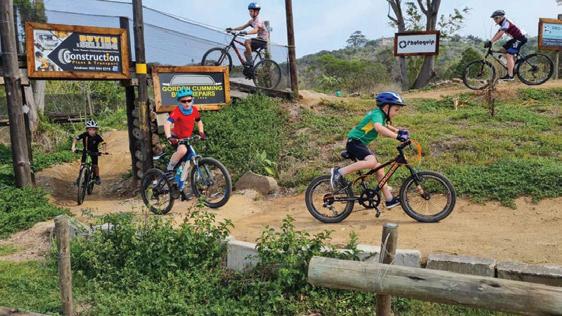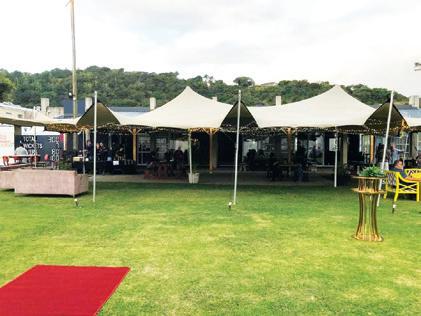
10 minute read
Nienaber talks about School and World Cup Rugby
In preparation for the World Cup tournament, we had an exclusive conversation with Jacques Nienaber about his life journey, the Springboks’ preparations for the World Cup, as well as a bit of school rugby.
By Durandt van Zyl,
Advertisement





You were initially a physiotherapist. How did you get involved in rugby and how did your path lead you to become a Springbok coach?
“After studying physiotherapy in Bloemfontein, I started working at a physiotherapy practice in Bloem and was asked to be the physiotherapist for the Free State Under-19 and Under-21 rugby teams. A few years later, I was appointed as the physio for the Cats in the Super Rugby series. Rassie was still a player at the Cats and would often do video analysis in the physio room using his “black box” (an analysis program he bought from the WNNR). He would occasionally call me to show me what he had analysed, and that’s how my interest was sparked.”
Jacques was the conditioning coach of the Cheetahs from 2004 to 2007, defensive coach for various unions between 2008 and 2014, including the Stormers, as well as in 2011 for the Springboks. He was also Munster’s assistant and senior coach from 2016 to 2017 before returning to South Africa and continuing his journey with the Springboks.
Tell us more about your school days. Where did you go to school and what position did you play?

“I was at Laerskool Riebeeckstad in Welkom and then went to Grey College as a boarder until grade 11. My parents then moved to Bloem, and I returned home in grade 12. It was a pity to miss my senior year in the boarding house. Athletics (800m and 1500m) and cross country were my main sports, but I also played rugby for fun with my friends for the lower teams and didn’t take it too seriously. I mostly played as a flanker.”
How important are rugby statistics like the number of tackles, metres run, etc. for young players?
“I think for primary school players, it should just be about enjoying the game, and even in high school too. But if you’re a more serious rugby player, then statistics become more important and can indicate important things for you. However, it shouldn’t become so important that it takes the fun out of rugby. What is that fun? It’s the times with your friends in the locker room, the team spirit, the circle before and after the game, Monday’s talk about Saturday’s match. Those are the things you remember.”

What would you say is the role of parents in primary school and high school?
“Parents shouldn’t take the fun out of the sport for their children by being too serious about it. In my opinion, a parent’s most important role is to support their children. Let the coaching be left to the coaches, and if your child is serious about their sport, teach them that it takes hard work to excel. There’s nothing wrong with putting in extra time. Again, the most important thing is for them to enjoy rugby. The ones who succeed are the ones who enjoy rugby immensely because the sacrifices you have to make can’t be made if you don’t love rugby, and without that love for the game, you’ll never have enough drive. You haveto take ownership as a player. What is ownership? It’s not just the coach’s job to make sure you improve, it’s your job to make sure you improve every day as well. Coaches are simply there to help and facilitate. It’s not your parents’ job to make sure you go and practice and train, it’s YOUR job”.
Players nowadays train with heavy weights from a young age. What is your opinion on that?
It’s an important topic. One must distinguish between weights and exercises using your own body weight and stretching. Any exercise that utilises your body weight is 100% effective and can contribute to your conditioning. However, when it comes to weights in the gym, you need to be careful as they can potentially damage your growth plates. If you’re training with weights, I recommend supervision and advice from a specialist or expert. Some young people’s growth plates close at an early age (around fourteen or fifteen), while others’ close at a later age (seventeen to eighteen). It’s very important to be cautious about starting weight training too early without proper supervision and advice from an expert.”
What do you think about the level of school rugby in South Africa compared to the rest of the world?
“I believe our school rugby is at a high and professional level. There are very few other countries’ school rugby programmes that can compete with ours. If you look at what some overseas schools invest in their rugby programmes, some of those schools spend more on rugby than some of our smaller local Currie Cup unions. Considering that, it’s incredible how good we are. Different countries have different development programmes for young players. Many of our successes at the senior level stem from the fact that our contact skills are developed at an early stage in school. In contrast, some overseas countries’ school programmes focus more on ball skills and individual abilities. It’s important to note that there is no right or wrong player development programme. Each country does what they believe works best for them”.
Is there an age at which young players should start establishing themselves in a position?
“There is no fixed recipe. You shouldn’t be nervous if you haven’t established yourself in a position yet – it will come to you. There are international players who played in different positions until they made it to their national team, even in their final year of school. In France, a player like Mathieu Bastareaud plays as a flanker for Toulon in some matches and as a centre in others. He represented France as a centre.”
What should primary and high school learners focus on in terms of game and technical development?


“Work on your skills as much as you can. You can never have too many skills. You can’t spend too much time on skill development. Players with vision are always noticed. Look at Lionel Messi, for example. He has crossed the field 676 times in the FIFA World Cup final, identifying the spaces and opportunities around him. From an early age, develop the habit of constantly observing what is.”
Scan QR code to watch a video of Lionel Messi scanning the field:
Contracting after school has changed a lot. What is a good route for young aspiring players to take for the best chance at success?



“There are several routes that can be followed, but three of the most common ones are as follows: The most common route is playing for your school’s first team, as well as participating in Craven Week (possibly also SA Schools). You get noticed by agents; you join a Union’s academy and play for their provincial junior U19 and U21 teams. Then you move up to the senior competitions (Currie Cup, URC, etc.) and eventually get selected for the Springboks.
The second route is playing for your school, continuing your studies, playing in the Varsity Cup, gaining exposure, and then being selected for a provincial junior U19 or U21 team, leading to a contract with a Union.
The third route is through club rugby, where you may be noticed for your good performances for your club and then invited to your Union’s training sessions, potentially earning a chance to play.”
Let’s talk Springbok rugby. It was recently mentioned that as a group, you were actually more focused on 2023 and that winning in 2019 was a bonus. What do you say?

“You are 100% correct. When our coaching team started in 2018, Springbok rugby was at a low point on the field (in terms of results) at that time. To turn things around and have a chance to win the 2019 Rugby World Cup, we had to come up with a plan that would give us a chance. We decided to play to the Springboks’ strengths, which included being physically dominant. Now, five years later, despite losing a lot of time during the Covid period, we’ve had a chance to increase the depth of players in all positions and work on individual skills. Many factors come into play, and success cannot be guaranteed, but we are in a good position. However, there is still hard work ahead to put the final pieces in place before the start of the World Cup.”































How
Nienaber talks about School and World Cup Rugby...continues from page 9 With the World Cup ahead, what has been your highlight so far as the Springbok coach?

“On the field, as head coach, it was definitely beating the British and Irish Lions. For twenty months, the players hadn’t seen each other, and being able to come together at short notice, along with the challenges posed by Covid, and winning the series was a significant highlight. Since we only play the Lions once every twelve years, few coaches get the chance to coach the Springboks against the Lions. So, as a coach, it was a great privilege. Also, considering that the Lions had triumphed over Australia and shared the series with the All Blacks, if we had lost, the Lions would have been undefeated against the three Southern Hemisphere nations, which made this victory even sweeter.
Off the field, my highlight has been seeing players develop and become comfortable within the team, watching their growth as individuals within the team environment, as adults dealing with the media, and seeing their increased sense of responsibility and profile development.”
Every player in the group is undoubtedly highly talented. What is your focus in terms of coaching each individual, as well as managing the players given their high profiles?
“I don’t believe it’s our coaching team’s role to manage the individual players’ profiles. They are grown men with their own families, and it’s their responsibility to take care of their profiles. Our role is to manage their roles within the team and to be open and honest with our players regarding their own performance, pointing out both the positive and negative aspects, identifying areas for improvement, and monitoring their progress together. We support them as individuals, but at the end of the day, no individual player’s profile is bigger than the Springboks’ profile.

We also try to teach the players that it’s their choice to read comments on social media, but ultimately, if they want to believe the positive comments, they have to accept the negative ones as well. Therefore, we prefer that players don’t actively follow social media and instead believe our feedback and opinions as coaches. Social media is not reality.”
Naturally, your target is to win the World Cup. Are you satisfied with where you are at this stage in terms of your goals?
“I think we are. Considering that we lost a lot of time in 2020/2021 due to Covid, we have done well. Our plan after 2019 was to focus on team development and growth because there wasn’t much time for that before the 2019 World Cup (only 18 tests). When I talk about team development, I mean increasing the depth in each position and improving the individual players’ skills. This process sometimes affected the on-field results, but it also put us in a much better position by having improved team development and individual skills compared to 2019. Following this path, we saw many players emerge in 2022 who made Springbok rugby much stronger.”
How important is your win record, as it is regularly published alongside previous coaches’ records?
“Naturally, if the team doesn’t win or perform, you lose your job. The challenge is always to do enough player development so that you don’t only have a player depth of 15-22 players. If you can achieve team performance while also increasing player depth, improving skills, and having a broader range of match strategies, I think you are on the right path because the ultimate goal of potentially winning a World Cup remains the most important.”
Many people wonder what your role is and what Rassie’s role is?
“The Director of Rugby and the head coach of the Springboks have different duties and roles. The easiest way to describe it is that I am responsible for what happens on the field, and Rassie is responsible for what happens off the field. However, it’s more complex than that, but that’s the simplest way to describe the division of our roles and duties. Rassie and I have come a long way together. We have a good working relationship, and through mutual respect, we provide insights into each other’s roles. But at the end of the day, each of us stands accountable for our results in our respective areas.”
What is the week like from Saturday to Saturday before a test?
“On the Sunday after the Saturday match, we start the Sunday morning with medical checks. Sundays are usually our travel day to the next destination. It’s the players’ responsibility to analyse their own performance (which is sent to them on Saturday night) and then meet with our coaches individually on Sunday evening to discuss it if necessary. On Sunday evenings, the coaches gather to discuss the strategy for the upcoming Saturday. Monday mornings involve video sessions with the team, where the previous match is analysed. From Monday to Wednesday, we have training sessions. The players’ “weekend” starts on Wednesday afternoon until Thursday, during which they can relax and do their own thing. Fridays involve captain’s practice depending on when the field is available, led by the captain. It usually doesn’t take longer than 30 minutes. On a match day, we start our internal programmes six hours before kick-off.”
You were involved with Munster before Springbok rugby. What made you decide to join Leinster (their biggest rival)?
“Well, it’s like any job. There was an open position, and I was approached and got the job.”

Can we expect you back one day?
“Definitely. A rugby coach’s path can go through many teams and countries, but in the end, I am a South African and a proud Springbok supporter. If the opportunity arises, I will come back. Coaching overseas exposes you to different coaching styles and new techniques, which are beneficial for me as a coach, and hopefully, I can bring that knowledge back to my own country someday.”
From AWSUM Schools News’ side, we want to wish you and your team all the best. We want to thank you for the role you have played in Springbok rugby, the example you have set, your humility, and the way you carry yourself in this significant position. JUST ONE REQUEST, PLEASE: Bring the World Cup home! South Africa stands behind you. Good luck. We are proud of you.





